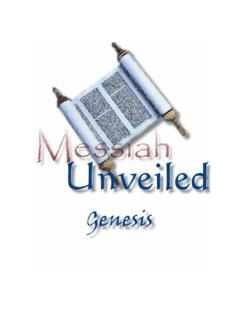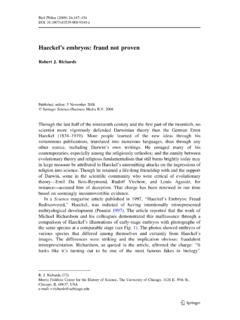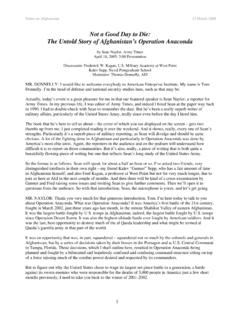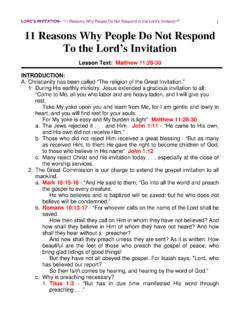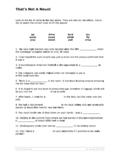Transcription of It's Not What You Think - It's What You Do - …
1 It s Not what You Think It s what You Do Copyright 2003, 2008 Sh ma! Chazak! Portions by Don Blanzy All Rights Reserved Scripture portions from New King James Version Nashville: Thomas Nelson PublisherIt s Not what You Think It s what You Do Table of Contents Introduction .. 3 Lesson One - Fear .. 7 Lesson Two Hear, Obey .. 13 Lesson Three Love .. 17 Lesson Four Treasure, Keep .. 23 Lesson Five Teach .. 27 Lesson Six Repent .. 35 Lesson Seven Give .. 39 Lesson Eight Worship .. 45 Lesson Nine Pray .. 51 Lesson Ten Fast .. 61 Lesson Eleven Serve .. 67 Lesson Twelve Build .. 73 Lesson Thirteen Work .. 79 Lesson Fourteen Rest .. 85 Lesson Fifteen Believe .. 93 It s Not what You Think It s what You Do Copyright 2003, 2008 Sh ma! Chazak! Portions by Don Blanzy All Rights Reserved Scripture portions from New King James Version Nashville: Thomas Nelson Publisher It s Not what You Think It s what You Do Let us hear the conclusion of the whole matter: Fear God and keep His commandments, For this is man s all.
2 For God will bring every work into judgment, Including every secret thing, Whether good or evil. Ecclesiastes 12:13-14 Introduction any have embraced the word Faith and its synonyms as foundations to their relationship with God. The word Believe is the foremost verb in doctrinal statements in most conservative denominations. Faith and Believe are words that are so powerful, they appear to make the Epistle of James oddly out of place in the New Testament Gospel. Pious men and women have struggled with the apparent contradiction of the Salvation by Grace with James statement, Faith without works is dead. 1 Beloved, we have a problem. Some have equated believing with thinking. They have assumed that if they agree with the right doctrine then all is well. Because of the confusion between thinking and believing, many hold to a teaching of easy-believe-ism.
3 Many are confused why some who have walked an aisle or raised a hand have not exhibited a changed life. Are there only some who become radically saved ? Is believing the same as thinking? Are doing and believing the same thing or are they opposites? Does an emphasis on doing equate to legalism? 1 James 2:16 MIt s Not what You Think It s what You Do Introduction 4 The English word Faith is a noun. what becomes evident as we examine Scripture is that maybe we should treat it like a Then God said, Let there be light ; and there was light Genesis 1:3 The Bible begins with God to and in that nothingness there was suddenly light. God did not Think light into existence He spoke. Scripture begins thus, with a command, a verb, and it ends with the same focus His commands and a blessing on those who do them.
4 Blessed are those who do His commandments, that they may have the right to the tree of life, and may enter through the gates into the city. Revelation 22:14 Then, in the middle of our Bibles we find Ecclesiastes 12:13-14 which summarizes the duty of man toward God: Fear God and keep His commandments, for this is man s all. Our problem with the doing vs. believing issue, is that we approach the Bible from a Western mindset, established from long traditions of Greek philosophy. The Bible does not come from that perspective; rather it comes from God s perspective to us and it is all about verbs. The Bible, in original form, is written in Hebrew and Greek with some Aramaic. In the TaNaKh, the Hebrew text sets the stage and establishes the framework and standards for understanding the Apostolic Scriptures. Even most of the Apostolic Scriptures were scribed by men whose first language was Hebrew.
5 The Hebrew of the TaNaKh2 establishes the way we should view the Greek in the Apostolic Scriptures and hence the English. Most Hebrew words come from a root verb. Even proper names and nouns have verbs as their root. That tells us is that Hebrew is a language of action. It is not a language of concepts, thoughts, and ideas. It is all about doing. Many, when they read in the TaNaKh about God s commands, simply chalk it up to something like the old way, before grace. This is a sad commentary on people s biblical knowledge, because if one studies the TaNaKh it becomes quite clear that the God of the TaNaKh is the same gracious God as the One revealed in the Apostolic Scriptures. Many people may be surprised to learn that although tradition says the TaNaKh has six hundred and thirteen commands to God s people, the Apostolic Scriptures contains more than a thousand commands.
6 Grace is not the opposite of God s commandments, it is what motivates and gives life to those commandments. 2 TaNaKh = Torah, Nevi im, Ketuvim or Torah, Prophets, and Writings what some call the Old Testament It s Not what You Think It s what You Do Introduction 5 And the LORD commanded us to observe all these statutes, to fear the LORD our God, for our good always, that He might preserve us alive, as it is this day. Deuteronomy 6:24 The purpose of this study is to help us begin to realize that if we are God s people, we need to be more active in our faith. We will accomplish this purpose by going through some of those action words those verbs in Scripture. We will in all cases attempt to examine Scripture from the Hebraic mindset. We will be challenging ourselves to quit thinking in a Western way. Remember, we are studying action words so simply agreeing with what your read means very little.
7 It is what you So, let s It s Not what You Think It s what You Do Introduction 6 It s Not what You Think It s what You Do Lesson One Fear 7 Lesson One - Fear Praise the LORD! Blessed is the man who fears the LORD, who delights greatly in His commandments. Psalm 112:1 He who has My commandments and keeps them, it is he who loves Me. And he who loves Me will be loved by My Father, and I will love him and manifest Myself to him. John 14:21 Then a voice came from the throne, saying, Praise our God, all you His servants and those who fear Him, both small and great! Revelation 19:5 By this we know that we love the children of God, when we love God and keep His commandments. For this is the love of God, that we keep His commandments. And His commandments are not burdensome. 1 John 5:23 odern believers are sometimes troubled by the biblical phrase fear God.
8 They are sometimes concerned about what (incorrectly) appears to be a TaNaKh teaching of salvation by works in the emphasis on the commandments of God. If one spends time reading the references about fearing God, we can begin to see a relationship between fearing God, and His commandments. There is not a change in the emphasis in the Apostolic Scriptures. Maybe we don t quite understand this word fear. Is it describing simply an emotion, or something else? Fear is the most powerful motivating force in our lives. It can strike us and cause us to be frozen in terror, or it can instantly cause us to flee in response to a physical threat. In all regards, it is something that motivates or makes us act in certain ways. On the next page, list some earthly things or circumstances that you have caused fear in your life in the past, or that you currently fear. Be honest.
9 MIt s Not what You Think It s what You Do Lesson One Fear 8 Earthly Things That Cause Me To Fear The Hebrew used most often for fear is yare (pronounced: yaw-ray). Yare is spelled yod-resh-alef. Yare can be used to describe an emotional response to something, but often in Scripture it is used in relation to God, and describes a motivation for certain actions. Hebrew letters were originally pictures. The pictographic mural of a Hebrew word can sometimes give us further insight into its meaning1. The pictograph of the letter Yod is that of the hand of God. The letter Resh pictures a head or chief. The letter Alef, the first letter, represents God Almighty. The pictograph of yare then shows the hand of God upon man s head, bringing him under God s authority. No wonder Scripture tells us not to yare man. Let s look at some of the usages of yare in the TaNaKh.
10 Read the following passages and note the relationship between fear of God and His commands, or His requirements. Genesis 3:9-11 (this is the first usage of the word yare in Scripture): Exodus 1:15-17: 1 Although Hebrew pictographs can help us gain insights into a word, we should never use them in a way that contradicts the meaning of a word in context. In reading and understanding Scripture, context remains our strongest guard against error. It s Not what You Think It s what You Do Lesson One Fear 9 Deuteronomy 10:12-13, 17-20: Psalm 86:11: Psalm 112:1: Proverbs 9:10: Ecclesiastes 12:13: The Theological Wordbook2 says, It is plausible that this usage of to fear [yare] as a virtual synonym for righteous living or piety grew out of viewing fear [yare].. as the motivation which produced righteous living.
